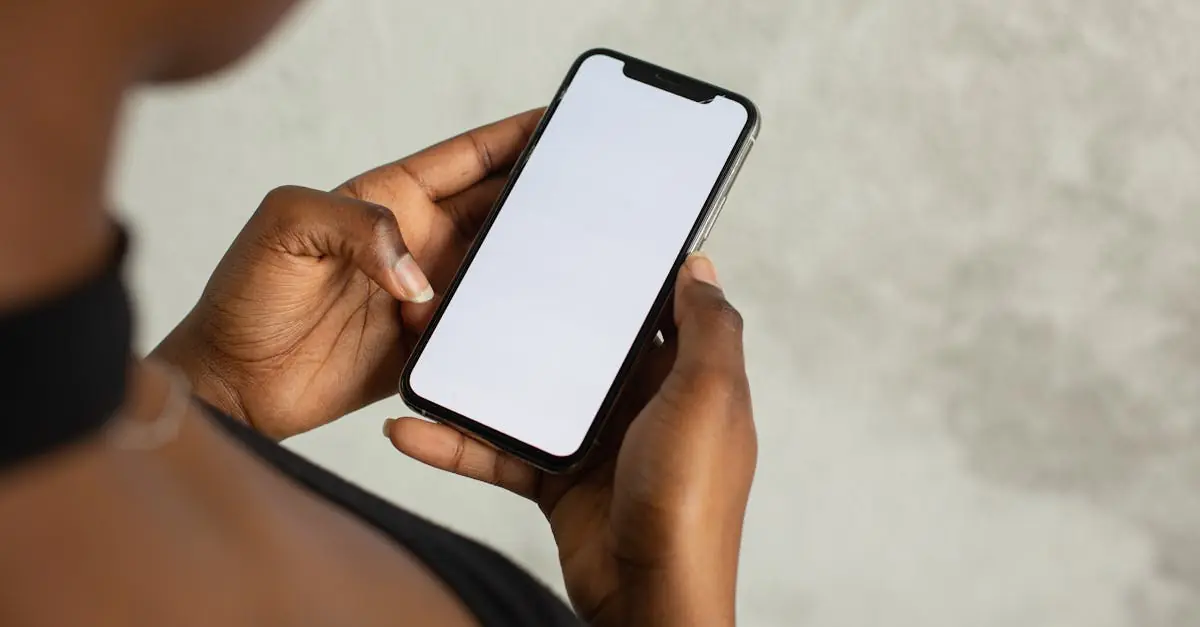Ever found yourself in the middle of an intense game or a crucial text, only to be unceremoniously booted back to your home screen? If so, you’re not alone. Many users face the frustrating phenomenon of apps crashing or force-closing without warning. It’s like your phone has a personal vendetta against your productivity or entertainment.
Table of Contents
ToggleCommon Reasons for App Disruptions
App disruptions often stem from a few common issues. Understanding these reasons can help users address and resolve the problems effectively.
Insufficient Storage Space
Insufficient storage space leads to app disruptions. When a device runs low on available storage, apps struggle to function properly. Users might notice that their phone speeds slow down or apps fail to load altogether. Clearing cache files, deleting unused apps, or transferring data to cloud services can free up space. Regularly monitoring storage capacity helps prevent this issue. A well-maintained device ensures smoother app performance.
Software Glitches
Software glitches frequently disrupt app functionality. These glitches may arise from outdated applications or operating systems. Users might experience crashes or unexpected closures during important tasks. Updating apps and the system software often resolves these glitches. Additionally, restarting the device can clear temporary issues and improve performance. Regular maintenance, including applying software updates, enhances stability and reduces the likelihood of disruptions.
Device Compatibility Issues
Device compatibility issues often cause unexpected app closures. Two significant factors contribute to this: outdated operating systems and unsupported app versions.
Outdated Operating System
An outdated operating system can lead to app crashes. Developers release updates to enhance performance and fix bugs. When users don’t update their operating systems, apps may not function correctly. Incompatibility with newer app features can occur, leading to sudden closures. Regularly checking for updates in settings helps maintain optimal device performance.
Unsupported App Version
Unsupported app versions frequently lead to interruptions. Developers design apps for specific operating system versions, ensuring compatibility. If the app version is older, it may struggle with newer device capabilities. Users need to update apps through their respective app stores to ensure smooth functionality. Ignoring these updates can result in crashes, affecting overall user experience.
Network Connectivity Problems
Network connectivity issues frequently disrupt app functionality. Poor connection quality can lead to applications unexpectedly closing or crashing, impacting user experience.
Weak Wi-Fi Signal
Weak Wi-Fi signal often causes apps to freeze or crash. When the signal strength drops below a certain threshold, data transfer slows significantly. This slowdown prevents apps from functioning properly, especially those requiring constant connectivity. Users should move closer to the router or eliminate obstructions between the device and router. In cases where signal issues persist, restarting the router may help restore connectivity. Regularly checking Wi-Fi settings ensures that the phone connects to the correct network.
Mobile Data Limitations
Mobile data limitations can also result in similar disruptions. When users exceed their data plan, speeds often decrease, impairing app performance. Certain apps may require a stable connection, making them susceptible to crashing during data limits. Users should monitor data usage through their device settings to prevent overages. Switching to Wi-Fi when available helps mitigate mobile data constraints. Additionally, enabling features like data saver mode can extend usability during periods of low connectivity.
Device Performance Factors
Device performance significantly impacts app stability. Several elements contribute to unexpected app closures, and understanding these factors helps address the issue effectively.
Low RAM Availability
Low RAM availability often leads to app crashes. When a device runs out of memory, it struggles to support multiple applications. Users can experience freezing or abrupt terminations of apps. Checking RAM usage regularly helps identify performance bottlenecks, and closing unneeded applications frees up valuable memory. Upgrading to a device with more RAM can also enhance multitasking capabilities. Employing a memory-boosting app can provide temporary relief by clearing background tasks.
Background Apps Running
Background apps running consume valuable resources. They can significantly hinder the performance of foreground applications. Many users forget to close apps after use, leading to unnecessary strain on processing power. Checking which apps operate in the background can reveal performance issues. Disabling or limiting background activity for certain apps enhances available resources. Adjusting settings to restrict background data can also help maintain smooth functionality. Regularly reviewing app usage allows for better management of device performance.
Tips to Prevent App Disconnections
Users can take proactive steps to minimize app disconnections. Addressing common issues can significantly enhance their experience.
Regular Updates
Keeping apps and the operating system up to date is essential. New versions often include bug fixes and performance improvements. Users should regularly check for updates in the app store or system settings. This practice can prevent compatibility issues and enhance stability. Scheduled reminders can help users stay on track with updates. Implementing these updates promptly aids in reducing crashes and interruptions during usage.
Clearing Cache and Data
Regularly clearing cache and data can improve app performance. Cache files accumulate over time and may slow down applications. Users can easily access settings on their devices to clear cached data for individual apps. Making this a routine task can lead to smoother operation. Additionally, clearing data may reset certain app settings, so users should consider backing up important information first. This simple action helps maintain optimal device performance and reduces the likelihood of unexpected closures.
Experiencing frequent app disruptions can be incredibly frustrating. By understanding the common causes such as insufficient storage outdated software and network issues users can take proactive steps to enhance their device’s performance. Regular maintenance like clearing cache updating apps and managing background activity can significantly improve stability.
Staying informed about device compatibility and monitoring network connectivity will further help in minimizing interruptions. With these strategies in place users can enjoy a smoother and more reliable app experience. Taking the time to address these issues not only saves frustration but also enhances overall productivity and enjoyment on their devices.





